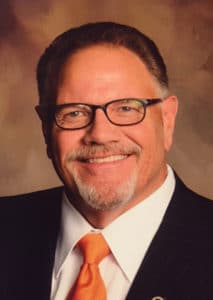DENTON—“We are on the same team,” Kevin Ezell, president of the North American Mission Board (NAMB), told state convention disaster relief directors and personnel assembled at Camp Copass in Denton Jan. 23-27. The conference marked the 50th anniversary of Southern Baptist Disaster Relief (SBDR).
Ezell’s remarks came Thursday, Jan. 26, a day after David Melber explained the restructuring of NAMB and the vital place of SBDR in NAMB’s compassion arm, Send Relief.
Related Story: SBDR celebrates 50th anniversary with look to the future
Ezell’s reassurances pleased the 165 attendees from 33 state Southern Baptist conventions and Canada, many of whom expressed concerns in recent years about the relationship between NAMB and SBDR.
“We have had almost a Holy Spirit type reunification and healing,” Scottie Stice, Southern Baptists of Texas Convention (SBTC) DR director, said. Stice credited Melber’s leadership as vice-president of Send Relief in soothing previous tensions.
On Wednesday, Melber emphasized SBDR as a component of Send Relief, whose compassion ministries also address community engagement, human trafficking, foster care and adoption, refugees, and college mobilization. The official roll-out of Send Relief came at the SBC annual meeting at St. Louis last June, Melber told the TEXAN.
Strengthening Relationships
Ezell opened Thursday’s remarks by wishing SBDR a happy anniversary. He joked about being misunderstood by rental car agents regarding his standard requested “designated downgrade” as president of a missions organization and admitted to enjoying his current rental, a speedy Dodge Challenger.
Lighthearted banter aside, Ezell moved to the serious business of providing a “30,000-foot flyover” of NAMB with its focus on getting “every church on mission.” Of the over 46,000 SBC churches, nearly one-third gave insignificantly to the Cooperative Program or baptized no one in the last two years, Ezell said.
“They don’t see the need in the shadow of their own steeple,” Ezell continued, emphasizing the importance of NAMB’s goal of planting 100 new churches a month since 900 churches drop out of the SBC annually.
Send Network, NAMB’s church planting arm, is “up and running well,” Ezell confirmed, with 5,000 churches engaged in sending or supporting church planters. “We are very thankful for where we are, and we have an incredible amount of momentum.”
As for Send Relief, Ezell said. “It’s something like you’ve never seen in your SBC life.”
Praising SBDR efforts, Ezell affirmed Melber’s earlier description of Send Relief and spoke on Mark 12.
“When you love the Lord your God with all your mind and heart and soul and strength, that’s going to transfer over to where you’re going to love your neighbor as yourself,” Ezell said, adding that love is “action.” He also noted the Lord’s teaching in Matthew 25 on ministering to the “least of these” as a sign of faithfulness to God.
“Send Relief is going to help churches understand it’s not about us. … It’s all about [God],” Ezell said, calling for a “whole generation of Southern Baptists who want to love their neighbors as themselves.”
Expressing gratitude for being a Southern Baptist, he laughingly noted that in a “big family” there can be a lot of “crazy uncles.”
“There’s some challenging people out there that you have to work with. I am a challenging person at times. But we are all in this together. We are here for a purpose. We want to do everything we possibly can to be the best partner with you. There are great days ahead.”
When asked about the relationship between disaster relief and church planting, Ezell cited SBDR efforts in New Orleans after Hurricane Katrina as significant yet characterized by “missed opportunities” that NAMB is now better prepared to address.
Ezell also discussed the challenges of church planting, explaining that NAMB had “raised the bar” for assessments and training. He praised the efforts of bi-vocational church planters, noting examples of successful pastors who kept their day jobs. “It’s not everybody being full time. It’s everybody being on mission.”
Following Ezell’s remarks, Louisiana DR’s Gibbie McMillan asked the audience, most clad in familiar SBDR yellow, to come forward and surround Ezell and Melber with prayer. McMillan previously served as the first DR director for SBTC, serving during the deployment to Hurricane Katrina.
Melber told the TEXAN that SBDR is “a very key part” of Send Relief.
“We are here to celebrate and affirm the 50-year history of the ministry. As we look to the future and see more people involved in mercy and compassion, ultimately [that] will feed more people into DR.”
Send Relief 2017 Goals
Send Relief’s 2017 goals include providing resources for state conventions to use with their churches.
“We will do many labs onsite in mercy and compassion, equipping and training where people come in and learn about certain initiatives, say foster care,” Melber said. Labs will highlight “tangible, easy steps” that can be reproduced in other churches, focusing on the “the best of the best out there.”
Melber said of Send Relief’s role, “We want to see churches on mission. Our purpose is to help churches take their next missional step” by emphasizing “local churches already doing it well,” disseminating that know-how to other churches.
“We have 46,700 churches throughout the SBC. Many are doing great things in mercy and compassion but not all. We want to see all churches doing so throughout North America, the U.S. and Canada.”
Melber noted the SBC contains 16 southern and 26 non-southern conventions, with different needs and challenges. The 50th anniversary SBDR meeting offered separate sessions between Melber and DR directors from both regions to address unique “obstacles and opportunities” and to explore NAMB’s role in assisting the states.
Of the meeting with southern DR directors, Stice said Melber affirmed NAMB’s support of established SBDR efforts.
Melber indicated “he wants to get in his lane and not disrupt what is already working well,” Stice said, adding that Send Relief will deploy media teams and trucks stocked with supplies like rolled roofing, water and containers for victims to use to gather belongings.
Send Relief is also establishing warehouses in strategic locations to house materials for rapid distribution in times of crisis, Stice added, praising NAMB’s past assistance in shipping such supplies as anti-mold treatment and Bibles directly to SBTC DR teams in the field.
With 87 percent of the resources in southern states, where the majority of SBC churches are, varying strategies are necessary in the non-South, Melber said.
Frank McCrary, director of Kansas Nebraska DR, called Melber’s meeting with non-southern states positive, speaking favorably of NAMB’s plan to deploy public information teams and trailers of supplies to disaster sites on day one of emergencies, allowing volunteer DR teams to assemble in the various states.
“We’ve been asked in the past, what took you so long?” McCrary said of the advantage of having an immediate DR presence backed up by state teams.
“We want to provide national coordination when it is needed,” Melber added, giving the example of the American Red Cross, a partner agency which, in times of a disaster, will deal with a single point of contact rather than 42 separate state conventions.
“I see NAMB supporting, not supplanting our efforts,” Stice said.


 Several years ago I lived in a town with a large institutional independent Baptist church. It was a good evangelistic church, and my kids went to a couple of events over there. Driving by, I recognized the logo they were using; it was the SBC logo (cross, Bible, globe) without the globe. I chuckled at the statement they were unintentionally making about the difference between Baptists who have formulated channels of cooperation and those who cooperate more fitfully and less strategically. Not to say that this good church and its sister independents didn’t do missions, but they did it in the way Southern Baptists found wanting early in our history.
Several years ago I lived in a town with a large institutional independent Baptist church. It was a good evangelistic church, and my kids went to a couple of events over there. Driving by, I recognized the logo they were using; it was the SBC logo (cross, Bible, globe) without the globe. I chuckled at the statement they were unintentionally making about the difference between Baptists who have formulated channels of cooperation and those who cooperate more fitfully and less strategically. Not to say that this good church and its sister independents didn’t do missions, but they did it in the way Southern Baptists found wanting early in our history.



 Dean Haun, pastor of First Baptist Church, Morristown, told the Baptist and Reflector his resignation was in response to the IMB’s May 2016 decision to sign an amicus brief in support of a mosque to be built in New Jersey.
Dean Haun, pastor of First Baptist Church, Morristown, told the Baptist and Reflector his resignation was in response to the IMB’s May 2016 decision to sign an amicus brief in support of a mosque to be built in New Jersey. 








